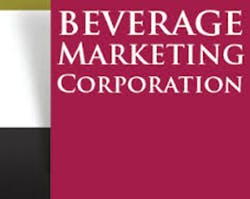The U.S. liquid refreshment beverage market stayed essentially unchanged in size in 2013, according to newly released preliminary data from Beverage Marketing Corp. Its flatness followed three years of growth. Some specific financial factors, such as cuts to the Supplemental Nutrition Assistance Program (food stamps) and the resumption of the payroll tax early in the year, affected consumers' purchasing power, while disruptive weather events also hindered the market's performance. Total liquid refreshment beverage volume stood at 30.2 billion gallons in 2013.
Niche categories continued to outperform traditional mass–market categories. Premium beverages such as energy drinks and, especially, ready–to–drink (RTD) coffee advanced particularly forcefully during 2013. Aggressive pricing contributed to the sizeable increase in bottled water volume. Larger, more established segments such as carbonated soft drinks and fruit beverages failed to grow once again.
RTD coffee moved forward faster than all other segments with a 6.2 percent volume increase in 2013. Nonetheless, the segment accounted for a relatively small share of total liquid refreshment beverage volume. Indeed, it was the smallest, trailing even value–added water, which registered the largest decline of any liquid refreshment beverage type (despite a strong showing by Glaceau Smartwater). Energy drinks advanced by 5.5 percent, but also remained fairly modest in size. Not surprisingly, no energy drink, RTD coffee or value–added water brand ranked among the leading trademarks by volume.
Sports beverages, in contrast, had Gatorade (including all brand variations) as the fifth largest beverage trademark during the year, and the category it led grew even as the overall liquid refreshment beverage market did not. The brand topped 1 billion gallons for the first time in 2011 and remained above that level in 2012 and 2013.Carbonated soft drinks remained by far the biggest liquid refreshment beverage category, but they continued to lose both volume and market share. Volume slipped by 3.2 percent from 13.3 billion gallons in 2012 to 12.9 billion gallons in 2013, which lowered their market share from 44 percent to less than 43 percent. Even so, certain soda trademarks, such as Canada Dry and certain varieties of Mountain Dew, did achieve growth. Moreover, carbonated soft drinks accounted for five of the 10 biggest beverage trademarks during 2013, with Coca–Cola and Pepsi–Cola retaining their usual first and second positions.
Bottled water had three entries among the leading trademarks in 2013. The category swelled by 4.7 percent in 2013.
Four companies accounted for all of the leading refreshment beverage trademarks. Coca–Cola had four brands, including the only fruit beverage brand to make the list, Minute Maid. Pepsi–Cola had three while Nestlé Waters North America (NWNA) had two and Dr Pepper Snapple Group (DPSG) had one.
"Beverages endured a transitional year in 2013," said Michael C. Bellas, chairman and CEO, Beverage Marketing Corp., in a prepared statement. "Even in the face of economic challenges, healthier products thrived and even formerly floundering segments like RTD coffee demonstrated their potential. Certainly the state of the economy is crucial for overall beverage category success, but so are products that connect with the evolving American consumer." Full report.





